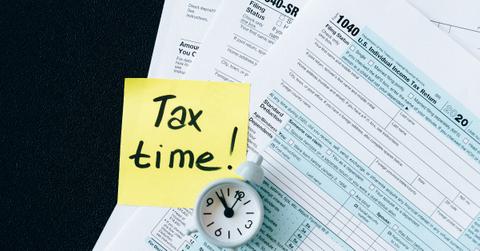Why You Should File Taxes Even If You Didn't Have Any Income
The deadline to file taxes for 2020 is May 17, 2021. It's a good idea file taxes even if you didn't have any income. Here's why.
May 3 2021, Published 1:27 p.m. ET

Taxpayers who made little to no income aren’t obligated to file their taxes. However, it still might be a good idea to do so, especially this year.
The deadline to file 2020 taxes has been extended until May 17, 2021, so you still have some time to file. It’s important you know how to file taxes with no income.

Why it’s important to file taxes with no income
Suppose you made less than $12,400 in 2020, which is the standard deduction. In that case, you could technically skip filing your taxes but doing so might affect whether you will receive the economic impact payments approved as relief from the COVID-19 pandemic.
The U.S. government used data from tax refunds issued by the IRS to distribute the three stimulus payments that have been sent out since last year. The total of the three payments amounted to $1,800. It's likely that non-filers didn’t receive any payments.
In October 2020, the IRS put out a step-by-step guide on how non-filers could get the economic impact payments through its Enter Payment Info Here Tool. Since then, the tool has closed.
Instead, the IRS encourages taxpayers eligible to receive the payments to file a 1040 or 1040-SR to claim the Recovery Rebate Credit.
Filing a tax return might also make it easier to receive tax credits for your dependent children. Under Biden’s $1.9 trillion American Rescue Plan Act, parents will receive child tax credits of $3,000 per child age 6–17 or $3,600 for children under six.
Filing a tax return will also make it easier for you to receive any future stimulus payments that might be issued this year.
What if my income decreased in 2020?
If your income decreased significantly in 2020 or if you have dependent children, you might also be entitled to receive more financial assistance due to the COVID-19 pandemic.
For example, some low to medium-income taxpayers might be eligible to receive the Earned Income Tax Credit (EITC) this year, even if they haven't been eligible in past years. The EITC gives a tax break to lower-income families and might even result in larger refunds.
According to the IRS website, the minimum adjusted gross income to receive the EITC for a single, head of household taxpayer with no dependent children is $15,820 or $21,710 for a married couple filing jointly with no children.
The maximum credit someone with no qualifying children can receive is $538, and the most a family with three or more children could receive is $6,660.
Non-filers might be able to file retroactively to claim and receive credit for the past three years if they file their taxes for the first time in 2020.
It’s better to be safe than sorry regarding taxes.
If you have any doubts about whether you are required to file taxes, it’s probably best to file to prevent the IRS from auditing you down the road.
